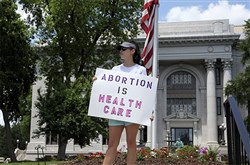VOL. 46 | NO. 33 | Friday, August 19, 2022
End of abortion in Tennessee prompts new questions
By Kathleen Carlson
Even though the Supreme Court has spoken on abortion in June in the Dobbs case – holding that there’s no U.S. constitutional right to abortion and it’s up to each state to regulate access to the procedure – the battle is far from over.
Uncertainties abound over just how Tennessee’s new Human Life Protection Act, forbidding abortion after an egg is fertilized, will be implemented starting next week when it takes effect.
Also unknown is whether Tennessee voters will signal support for abortion rights in their votes for state lawmakers in November’s midterm elections.
Perhaps most importantly, questions swirl around a right to privacy, a foundation of the earlier federal abortion cases overturned in Dobbs, Roe v. Wade and Planned Parenthood v. Casey.
Vanderbilt professor of law Ellen Wright Clayton, who holds both law and medical degrees, says the right to privacy is based on the principle that certain decisions are so essential to how people live their lives that the state cannot intervene.
That right “isn’t just a right over bodily autonomy. It is the right to make decisions that are essential to how we think of ourselves,” says Clayton, who in addition to being a law professor is the Craig-Weaver Professor of Pediatrics and Professor of Health Policy at Vanderbilt.

Abortion-rights supporter Jessica Smith demonstrates in front of the Hamilton County Courthouse. Tennessee’s ban on abortions, triggered by the Supreme Court decision overturning Roe v. Wade earlier this summer, takes effect Aug. 25.
-- Photo By Ben Margot | ApThus, she says, the state of Connecticut couldn’t forbid married couples from using contraception, the Supreme Court ruled in 1965, citing marital privacy. Later U.S. Supreme Court decisions were rooted in the right to privacy, including the 1973 decision in Roe v. Wade, which found a constitutional, privacy-based right, with limitations, of whether to terminate a pregnancy.
The U.S. Constitution doesn’t say anything about abortion or privacy, a bone of legal contention for decades. Cases including Roe found a right to privacy implied in constitutional guarantees of liberty, but the current Supreme Court has backed away.
Clayton says the Dobbs case means certain rights that “inhere in what it means to be a human being” don’t exist in the U.S. Constitution unless they are specifically mentioned or existed in society as it operated at the time the 14th Amendment became part of the Constitution in the 1860s. That amendment has been used to extend certain federal constitutional rights to the states.
Clayton said the majority opinion in Dobbs says the ruling affects only abortion rights, not contraception or other situations in which a privacy right has been recognized. But she adds that a concurring opinion by Justice Clarence Thomas opens the door to the high court reexamining other cases involving privacy, including those involving contraception and same-sex marriage.
With Dobbs as the law of the land, any legal right to terminate a pregnancy is in the hands of each state. In Tennessee, that means that any change in state abortion law must go through the state Legislature.

Knoxville protesters during a June march protesting the overturn of Roe v. Wade.
-- Shutterstock.ComIn November, Tennessee voters will choose a governor, 17 state senators and 99 state representatives. Whether abortion rights will make a difference in the election remains to be seen.
“I don’t know if we know enough yet to say (Dobbs) will only affect voters at the margins (the swing voters who will make a difference in very contested, evenly split races),” says Kent Syler, professor of political science and public policy at Middle Tennessee State University. “…I can safely say it is not going to get the Republican candidates any more votes. The question is how potent an issue it is for Democrats and whether it just impacts them positively at the margins or more.”
Syler has been involved in Tennessee politics for more than 30 years, serving as Tennessee chief of staff for U.S. Rep. Bart Gordon, a Murfreesboro Democrat, from 1985 until Gordon’s retirement in 2011.
Nationally, many battlegrounds in November elections will be in suburban areas, Syler says. In many states, including Tennessee, urban areas tend to be blue and rural areas tend to be red. Suburbs contain swing voters, particularly educated female voters.
“Those are the voters to really watch and the ones that can make a difference in close races,” he adds.
The state referendum on abortion in Kansas showed the issue can motivate people to vote, he says.
Tennessee Senate Majority Leader Jack Johnson, a Franklin Republican, says “Tennessee and Kansas are two very different states, and Tennesseans remain staunchly pro-life.

Gov. Bill Lee described the decision in Dobbs v. Jackson Women’s Health Organization as the “beginning of a hopeful, new chapter for our country.”
-- Photo By Mark Zaleski | Ap“Given the Dobbs Supreme Court decision, Tennessee’s abortion laws will likely be up for debate next year, and any legislation will be thoroughly examined by the General Assembly as it always is – in the committee process.
“Contraception will remain legal and readily available to responsible adults in Tennessee. In fact, in recent years, the General Assembly has made contraception more easily accessible by allowing women 18 or older to obtain contraceptives directly from pharmacists,” Johnson said.
State Sen. Raumesh Akbari, a Memphis Democrat, says “Kansas showed us that voters will correct course when politicians go too far in using the government to intrude on personal health care decisions.
“After the Supreme Court overturned Roe, our caucus announced a slate of policies to protect women, doctors and families from government overreach on reproductive health care. We’ll be introducing those bills when the legislature reconvenes.”
State Rep. Gloria Johnson, a Knoxville Democrat, says she has requested bills to be written to codify Roe, make exceptions to allow abortion in cases of rape and incest, to make exceptions to allow abortion to protect the life of the mother, and prevent the criminalization of medical professionals.
As for implementing the new law, Syler raises many questions: How will states enforce a law making all or virtually all abortions illegal? Will states keep people from going to another state where abortion is legal to terminate a pregnancy? Will states have police checking cars crossing state lines?
Opinion on abortion in Tennessee may be more evenly divided than state legislative votes on abortion indicate. In the current legislature, 27 of 33 state senators are Republicans. In the state House, Republicans have a 73-24 advantage with one Independent and one vacancy.
The Human Life Protection Act passed in 2019 by a vote of 26-5 in the state Senate and 69-24 in the House.
But a Vanderbilt University poll of 1,000 registered Tennessee voters, taken between April 26 and May 14 found that half of Tennessee voters consider themselves pro-life and nearly half, 48%, consider themselves pro-choice.
The Supreme Court’s Dobbs decision overturning Roe was leaked to the press May 2 and officially announced June 24. Five justices joined Justice Samuel Alito’s opinion overturning Roe, Chief Justice Roberts concurred in the judgment, and justices Breyer, Kagan and Sotomayor dissented.
Asked about their support for abortion itself, 36% of Vanderbilt poll respondents said it should be legal in all cases, and another 44% said they support legal abortion in cases of rape, incest, or when the life of the mother is in jeopardy. Some 17% said abortion should always be illegal. The margin of error in the poll was plus or minus 3.8 percentage points.
Notwithstanding the recent poll results, state voters have voted to limit abortion rights. In a 2014 referendum, they approved adding language to the state constitution making it clear that the Tennessee Constitution didn’t support a right to abortion.
Tennessee has an anti-abortion Republican governor and both houses of the legislature are controlled by a Republican supermajority. Lawmakers have had laws in place since 2019 to restrict abortion in the event that Roe was overturned.
The Tennessee Human Life Protection Act goes into effect next week, forbidding abortion after a woman’s egg is fertilized. The law contains no exceptions. The woman having the abortion can’t be prosecuted, but physicians can face felony charges under the law. Physicians who perform abortions when they believe it is necessary to save the mother’s life or prevent irreversible impairment of a major bodily function can raise those circumstances as affirmative defenses if they’re charged criminally. But if convicted, they face from three to 15 years in prison and they can be fined up to $10,000.
In 1973, when the Supreme Court decided Roe v. Wade, there was little agreement on abortion. The website of the Legal Information Institute of Cornell Law School notes 46 states needed to change their abortion laws as a result of Roe. There’s no agreement now, as the Vanderbilt polling on opinions on abortion indicates.
MTSU’s Syler says he wonders how the details about abortion will be worked out after Dobbs. He asks, for example, if states will keep people from going to another state where abortion is legal to terminate a pregnancy. Will states have police checking cars crossing state lines?
“The old adage is that it’s more fun for a dog to chase a bus than to actually catch it,” Syler says. Now that the Supreme Court has overruled Roe v. Wade, he says, anti-abortion voters in effect have “caught the bus…now they have to deal with all these issues.”